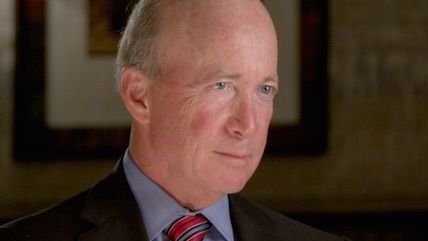With Mitch Daniels Republicanism on the Outs, Mitch Daniels Cozies up to Gary Johnson
Former Indiana governor pushes for Libertarian nominee's inclusion in the debates, hosts a big event for him at Purdue, and writes WSJ op-Ed about an issue only Johnson is any good on


"You just gave a string of…intelligent, candid, politically risky, unpredictable answers, all apparently grounded in a consistent political philosophy," former Indiana governor and current Purdue University President Mitch Daniels told Libertarian Party presidential nominee Gary Johnson Tuesday night, after an hour-long Q&A in front of 1,000* enthusiastic attendees at Purdue. "What are you doing in this election?"
If it were up to some #NeverTrump conservatives, the question would be inverted, and thrown back at Mitch Daniels: "What are you doing NOT in this election?" In June, syndicated columnist George Will, a longtime fan, lamented that "Purdue has the president America needs." (Asked about Daniels by the Lafayette Journal & Courier last December, Will said "Every time I open the page and see who's running for president, I think of the man who isn't there.")
The case for Daniels would have been obvious in your father's GOP. As governor of Indiana from 2005-2013, he was Scott Walker without the drama, reforming public-sector union rules and benefits, reducing the state's workforce, contracting out stuff the government didn't need to monopolize, introducing right-to-work laws, fixing the Bureau of Motor Vehicles, balancing budgets and leaving a surplus. He was chief of staff for Sen. Richard Lugar (R-Ind.) in the '70s and '80s, helped Indianapolis mayor Stephen Goldsmith make that city a trailblazer for privatization in the '90s, served as George W. Bush's director of Office of Budget and Management in the early aughts, and bracketed those governmental stints with work at nonprofits (Hudson Institute) and mega-profits (Eli Lilly). He is a decent and likable fellow who takes federalism seriously, name-checks Virginia Postrel, famously called for a "truce" on Culture War issues while we focus like a laser beam on fixing the country's godawful long-term fiscal picture, and genuinely believes that government can be done better by making it smaller.
In other words, there's very little room for Mitch Daniels in today's GOP.
This may help explain why, over the past 10 days, Daniels has been all up in the business of a similar former governor, Gary Johnson, in the run-up to the Libertarian Party nominee finding out whether he will be selected to participate in the first presidential debate on Sept. 26.
Daniels is no mere spectator to that decision—he's one of 14 board members of the Commission on Presidential Debates (CPD), the controversial "nonpartisan" body created by the Republican and Democratic parties in 1987 to serve as gatekeepers for general election presidential debates. And on Sept. 7, while conducting a public Q&A with the co-chair of the CPD, former Bill Clinton White House spokesman Mike McCurry, Daniels became the first board member to publicly endorse the inclusion of Gary Johnson into the debates. "People are so obviously shopping and wishing for some other choice," Daniels said. "This is awfully important." As for the Democratic-Republican matchup, "I hope each party will come to be led by people who want to compete for the center."
That last sentiment in particular fits snugly into one of Johnson's go-to campaign pitches (one that he repeated by Daniels' side six days later): that he and vice presidential nominee William Weld are in the six-lane highway at the neglected center of American politics. And in that center are some distinctly Danielsesque notions of good government, personal decency, and an honest confrontation of the country's most pressing and difficult policy issues, starting with the dire long-term fiscal outlook of the United States.
And lo and behold, Mitch Daniels had a Wall Street Journal op-Ed on that topic the very next day. Excerpt:
A national government that, year after year, borrows enormous sums and spends them not on genuine investment in the future but on current consumption, passing the bill down to others, pretending that the problem is smaller than it really is, lacks not only good judgment but integrity. It is not hyperbole to label such behavior immoral. […]
In fairness, a few members in each political party have tried to address the coming crisis. To them, all thanks and credit. To those still in denial, or even advocating steps that would make our debts even higher, please reconsider. Your careers may end happily before the reckoning. Your re-elections may not be threatened by your inaction. But your consciences—and what Lincoln called "government of the people, by the people, for the people"—will be.
The piece, half of which is just pure exasperation at how obvious these observations should be to governing Democrats and Republicans, does not mention any third-party politicians. But as I point out in my October-issue cover story, it is remarkable the extent to which the major parties and their presidential candidates have recently abandoned even rhetorical feints toward clipping the growth of long-term spending, and instead have made extravagant promises of vast new government spending projects. Meanwhile, the only White House aspirants who make tackling the debt central to their campaign are Johnson and Weld.
Given the death of the Mitch Daniels GOP, and the fact that the only people acting like the adults in the room are Libertarians, a natural question arises: Where the heck are the endorsements from politicians who in their heart know Johnson is right?
In Daniels' case, he doesn't want to ruffle political feathers as the ex-politician head of a public university. But he's hardly the only limited-government and/or independent-bent Republican ex-pol who feels alienated from Donald Trump's crass, big-government GOP, and who can certainly recognize a ticket of '90s blue-state Republican governors as two of their own. Yet about the only thing you'll get from the Christine Todd Whitmans and Arnold Schwarzeneggers of the world is "let them debate."
Which is better than nothing, but the reluctance to endorse is still striking, particularly for those (unlike, say, sitting senators such as Mike Lee and Jeff Flake), who no longer have to face voters and endure caucus meetings. It is a testament to the abiding power of two-party mental frameworks and social habits that, faced with two of the most statist presidential candidates either major party has thrown up in several generations, no major libertarian-leaning politicians or ex-politicians can bring themselves to endorse the ticket that absolutely agrees with them about the core issue facing the country.
* Some Johnson campaign staffers are furious at my estimate here, insisting it was closer to 2,000, and pointing to a Lafayette Journal & Courier article estimating a crowd of "at least" 1,380. For what it's worth, I counted the seats beforehand, and conducted five audience head-counts, the last of which came to 900, 10 minutes before the start of the Q&A.
Bonus link 1: Me presciently disagreeing with The Volokh Conspiracy's David Bernstein in May 2011, when he argued that given the GOP prominence of Mitch Daniels, Ron Paul, and Gary Johnson, it was time for the Libertarian Party to "fold shop."
Bonus link 2: Me interviewing Mitch Daniels last May:


Show Comments (57)